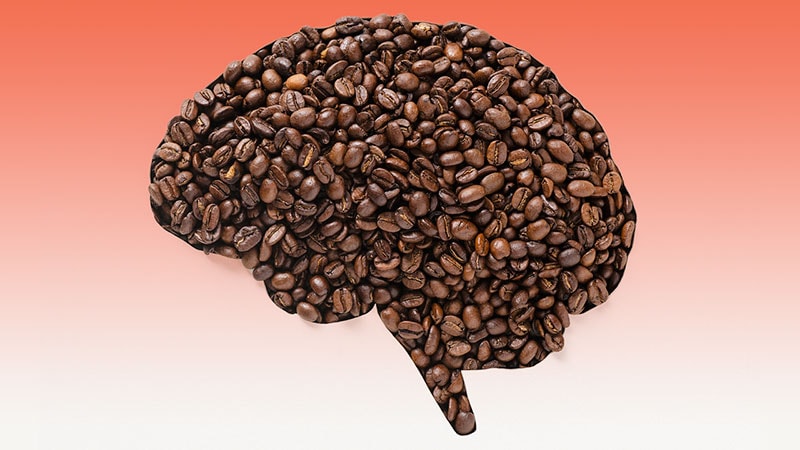Regular Coffee Drinking Tied to Functional Brain Changes
Batya Swift Yasgur, MA, LSW
April 26, 2021
Drinking coffee on a regular basis appears to enhance concentration and improve motor control and alertness by inducing functional and connectivity changes in the brain, a new imaging study suggests.
Using fMRI, researchers found that connectivity in the somatosensory and limbic resting states was reduced in regular coffee drinkers (CDs) in comparison with non–coffee drinkers (NCDs), suggesting an association between coffee drinking and improved motor control and alertness. In addition, dynamic activity in several cerebellar and subcortical areas of the brain was increased among CDs, consistent with an improved ability to focus.
Similar structural and connectivity changes were seen in the brains of NCDs after they had consumed a cup of coffee.
"The take-home message for practicing clinicians is that the regular intake of coffee, by reducing the connectivity of particular brain networks at risk, may be of relevance for attention/alertness, with possible implications in learning and memory, and also for motor control," senior author Nuno Sousa, MD, PhD, professor, School of Medicine, University of Minho, Braga, Portugal, told
Medscape Medical News.
"For the general public, the take-home message is that we now know better how the regular intake of coffee prepares your brain for action and prompt response," he said.
The study was
published online April 20 in
Molecular Psychiatry.
Coffee "Signature"
Coffee holds "particular interest for human health, in view of its short-term effects on attention, sleep, and memory and its long-term impact on the appearance of different disease and on healthy span of aging," the authors write. Yet, despite its "widespread use," little research has focused on the "effects of its chronic consumption on the brain's intrinsic functional networks."
The study "was not intended to measure the beneficial vs deleterious effect of
caffeine in the brain, where there are several conflicting results," said Sousa.
Rather, he noted, the investigators' motivation was to investigate the impact of regular coffee intake on brain connectivity, sometimes described as the "signature" of regular coffee drinking.
The researchers compared 31 CDs to 24 NCDs. The groups did not differ in age (range, 19 – 57 years) or number of years of formal education. However, there were slightly more men than women in the CD group (41.95% vs 33. 33%).
In additional to demographic information, the researchers assessed caffeine consumption habits and participants'
depression, anxiety, and stress (determined on the basis of the Depression, Anxiety and Stress Scales).
CDs were defined as those who consumed ≥1 cups of coffee per day; NCDs were defined as those drinking <1 cup per week.
Following an intake interview, participants underwent resting-state MRI. For the NCDs, the first scanning session was followed by injection of coffee, and fMRI was performed ~30 min later.
The Caffeinated Brain
Prior to coffee consumption, among the coffee group, there was "a tendency" toward lower functional connectivity (FC) patterns in the components of most brain networks, but significant between-group differences were found only in the somatosensory and limbic networks, including the right precuneus and right insula.
The authors note that these effects were linearly associated with the frequency of consumption of caffeinated products.
"Importantly, the group differences described were reduced after NCD drank coffee, [which] points to a potential causality link between coffee drinking and the above-described changes in lower connectivity," they write.
| Somatosensory network | Limbic network |
|---|
| Pre- vs post-NCD: t value = 1.86, P = .075 | Pre- vs post-NCD: t value = 3.88, P < .001, |
| Post-NCD vs CD: t value = −2.89, P = .006 | Post-NCD vs CD: t value = −1.46, P = .15 |
In a connectomics analysis, conducted using a network-based statistics approach, the strongest network connections were within the thalamus, the cerebellum, the right post-central gyrus, the left middle temporal gyrus, the left precentral gyrus, the bilateral caudate, and the putamen. After consuming caffeine, individuals in the NCD group had a "similar profile" to that of the CD group.
Mean FC was negatively associated with the frequency of caffeine consumption (
P < .001).
The dynamic analysis found that one functional subsystem lasted significantly longer in CDs than in NCDs (17.95 ± 18.32 vs 8.95 ± 6.13 sec). A separate dynamic analysis found that lifetime results were positively correlated with the frequency of caffeine consumption (
P = .012).
"After drinking coffee, both the lifetime and the probability of this state in NCD became closer to the values observed in CD, with the probability not being significantly different from CD...while being significantly higher than NCD pre-coffee," the authors report.
There were no significant differences between the groups in levels of depression. However, among the CD group, levels of stress were higher (particularly in regard to difficulty relaxing and nervous arousal), compared to the NCD group (median, 6.0 vs 4.0).
Greater frequency of caffeine use was associated with increased anxiety in men (
P = .023).
The authors note that the data "represent a contribution to the knowledge of the 'caffeinated brain' and how these changes underlie the behavioral effects triggered by coffee intake, with implications for physiological and pathological conditions."
Double-Edged Sword
Commenting on the study for
Medscape Medical News, Astrid Nehlig, PhD, research director emeritus, French Institute for Medical Research (INSERM), who was not involved with the study, said decreased functional connectivity in somatosensory and related networks in volunteer CDs "likely represents a more efficient and beneficial pattern of connections, with respect to motor control and alertness."
Also commenting on the study for
Medscape Medical News, J. W. Langer, MD, lecturer in medical pharmacology, University of Copenhagen, Copenhagen, Denmark, who was not involved in the study, noted that it "also shows a possible link between habitual coffee consumption and higher stress and anxiety levels."
Although this is "only an association and not a causal finding, it reminds us that coffee can be a double-edged sword and that some people might react negatively to habitual coffee drinking."
The study was funded by the Institute for the Scientific Information on Coffee. Although it had no influence on the experimental design or data analysis/interpretation. Individual authors received funding from an array of sources, as described in the original article. Nehlig and Langer have disclosed no relevant financial relationships.
Mol Psychiatry. Published online April 20, 2021.
Full text
For more Medscape Psychiatry news, join us on Facebook and Twitter.
Medscape Medical News © 2021
Send news tips to
[email protected].
Cite this: Regular Coffee Drinking Tied to Functional Brain Changes -
Medscape - Apr 26, 2021.





